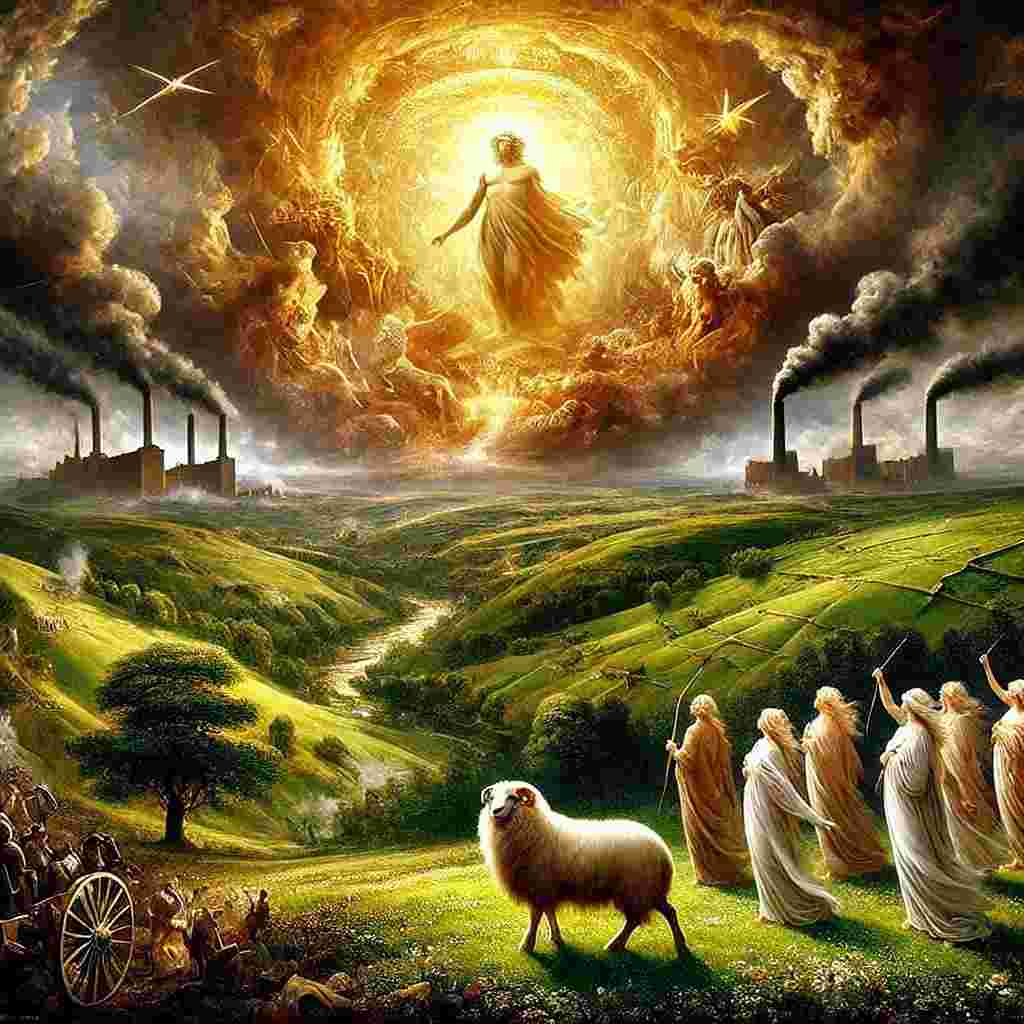Jerusalem
William Blake
1757 to 1827

Want to track your favorites? Reopen or create a unique username. No personal details are required!
And did those feet in ancient time
Walk upon Englands mountains green:
And was the holy Lamb of God,
On Englands pleasant pastures seen!
And did the Countenance Divine,
Shine forth upon our clouded hills?
And was Jerusalem builded here,
Among these dark Satanic Mills?
Bring me my Bow of burning gold:
Bring me my arrows of desire:
Bring me my Spear: O clouds unfold!
Bring me my Chariot of fire!
I will not cease from Mental Fight,
Nor shall my sword sleep in my hand:
Till we have built Jerusalem,
In Englands green & pleasant Land.
William Blake's Jerusalem
William Blake’s Jerusalem (also known as the preface to his epic poem Milton: A Poem) is one of the most iconic pieces of English literature. Often interpreted as both a spiritual hymn and a political statement, the poem merges Christian mysticism with Blake’s critique of industrialism and his vision of a restored, divine England. The work is steeped in metaphor, religious allusion, and Romantic-era sensibilities, demanding a close reading to unpack its layered meanings.
Themes
The poem revolves around three central themes:
- Spiritual Redemption and Divine Vision: The imagery of Christ and Jerusalem evokes the possibility of spiritual renewal and a return to a divine ideal.
- Critique of Industrialization: The “dark Satanic Mills” symbolize the dehumanizing forces of the Industrial Revolution.
- Human Agency in Transformation: The speaker's call for action emphasizes personal and collective responsibility in creating a utopian society.
Stanza-by-Stanza Analysis
Opening Questions (Lines 1-8):
The poem begins with four rhetorical questions:
"And did those feet in ancient time
Walk upon Englands mountains green?"
Blake references the apocryphal legend that Jesus visited England as a child, tying this myth to the idea of England as a potential holy land. The repetition of “And” lends a sense of urgency and continuity, as if the speaker is longing for answers to these profound questions.
- The “holy Lamb of God” is a reference to Jesus Christ, symbolizing purity, sacrifice, and redemption.
- The phrase “pleasant pastures” evokes an idyllic pastoral England, contrasting sharply with the "dark Satanic Mills" that follow.
- The “Countenance Divine” shining upon “clouded hills” juxtaposes divine light with human spiritual obscurity, implying that divine revelation has been obscured by modernity.
The final line of this section introduces “dark Satanic Mills,” a metaphor for the Industrial Revolution’s factories and their destructive impact on nature, spirituality, and human dignity.
The Call to Arms (Lines 9-16):
"Bring me my Bow of burning gold:
Bring me my arrows of desire:
Bring me my Spear: O clouds unfold!
Bring me my Chariot of fire!"
This section marks a shift from contemplative questioning to a passionate call to action. The speaker invokes a series of biblical and martial symbols:
- The “Bow of burning gold” and “arrows of desire” suggest spiritual weapons, emphasizing the inner struggle to reclaim holiness.
- The “Spear” and “Chariot of fire” recall biblical images of divine intervention and apocalyptic vision, especially from the story of Elijah’s ascent in a fiery chariot.
The imperatives—“Bring me”—convey urgency and determination, aligning the speaker’s mission with divine will.
Resolve and Purpose (Lines 17-20):
"I will not cease from Mental Fight,
Nor shall my sword sleep in my hand,
Till we have built Jerusalem,
In Englands green & pleasant Land."
The final stanza is a declaration of unwavering resolve. “Mental Fight” underscores that the battle is spiritual and intellectual, not physical. The "sword," while traditionally a weapon, symbolizes the power of truth and moral determination.
The concluding lines reaffirm the central mission: to “build Jerusalem” in England. Here, "Jerusalem" functions as both a literal reference to the biblical holy city and a metaphor for a utopian ideal—a society free of oppression, materialism, and spiritual decay.
Form and Structure
Blake employs a simple yet powerful quatrain structure (four-line stanzas) with alternating rhymes (ABAB). This regularity enhances the hymn-like quality of the poem, reinforcing its status as a call to spiritual awakening.
The poem’s meter, predominantly iambic tetrameter, creates a rhythmic and lyrical flow, reflecting its dual role as both a poetic and musical piece. The repetitious “And” and imperative “Bring me” contribute to the building momentum, mirroring the speaker’s rising intensity.
Historical Context
Blake wrote Jerusalem during the early 19th century, a time marked by rapid industrialization, political unrest, and growing economic inequality in England. The “dark Satanic Mills” encapsulate his critique of the Industrial Revolution and its alienation of humanity from nature and the divine.
Blake’s vision of “Jerusalem” aligns with his broader Romantic ideals: a return to imagination, spiritual truth, and harmony with nature. His work often challenged institutional religion and oppressive societal structures, advocating instead for a deeply personal and visionary spirituality.
Conclusion
Jerusalem by William Blake is a profound meditation on the potential for spiritual and social transformation. By intertwining biblical imagery with Romantic-era critiques of industrialism, Blake creates a timeless call for renewal and resistance against forces that dehumanize and alienate. Its combination of lyrical simplicity and philosophical depth has ensured its enduring resonance, both as a literary work and as a cultural anthem for those seeking justice and spiritual rebirth.
This text was generated by AI and is for reference only. Learn more

